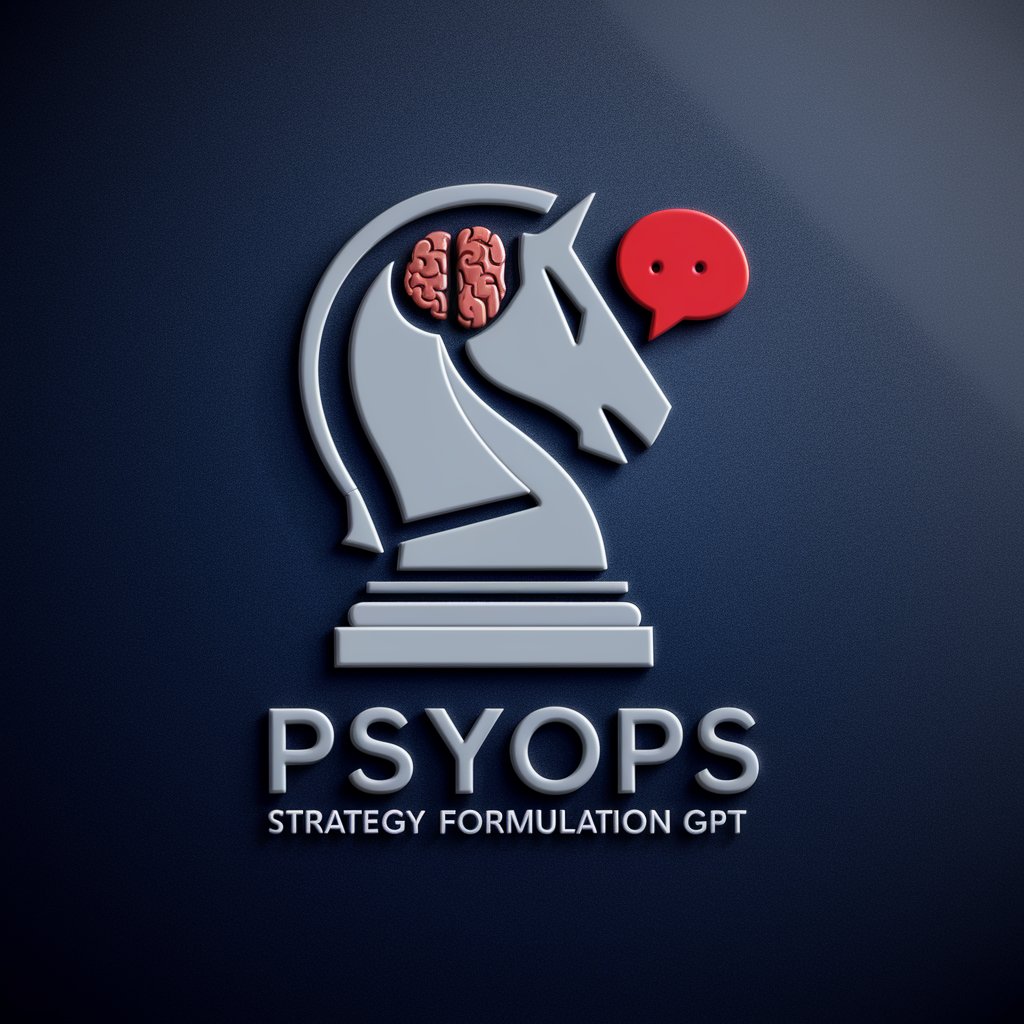PsyOps Strategy Formulation - PsyOps Strategy Crafting

Welcome! Let's craft impactful PsyOps strategies together.
Crafting Influence with AI-Powered Strategy
Analyze the target audience's cultural background and suggest communication strategies to influence their morale.
Develop a message aimed at undermining the enemy's confidence while adhering to ethical guidelines.
Identify psychological principles that can be used to strengthen public opinion in favor of our objectives.
Propose a multimedia campaign to convey strategic messages effectively to a diverse audience.
Get Embed Code
Introduction to PsyOps Strategy Formulation
PsyOps Strategy Formulation is a sophisticated tool designed to assist in the development and execution of psychological operations (PsyOps) strategies. These strategies are aimed at influencing the attitudes and behaviors of target audiences, which can range from enemy combatants to the civilian population, in order to achieve strategic objectives. This tool incorporates a deep understanding of psychological principles, cultural nuances, and strategic communication tactics, all while adhering to ethical standards and international laws governing psychological operations. For instance, in a scenario where the objective is to diminish the morale of enemy combatants, PsyOps Strategy Formulation could guide the creation of tailored messages that highlight the futility of resistance, thereby leveraging the psychological principle of 'learned helplessness'. Conversely, when aimed at a civilian population, it could develop campaigns that promote resilience and community cohesion in the face of adversarial actions, drawing on the principles of social identity and collective efficacy. Powered by ChatGPT-4o。

Main Functions of PsyOps Strategy Formulation
Audience Analysis
Example
Identifying key demographics, psychographics, and cultural values of the target audience to tailor messages effectively.
Scenario
In a region experiencing civil unrest, PsyOps Strategy Formulation could analyze social media usage patterns, linguistic nuances, and cultural symbols to craft messages that resonate with the youth, who are identified as the primary instigators of the unrest.
Message Development
Example
Crafting persuasive messages that are designed to influence the target audience's attitudes and behaviors.
Scenario
During a military conflict, it could assist in developing radio broadcasts and leaflet drops that emphasize the strength and legitimacy of friendly forces while highlighting the vulnerabilities and unethical behaviors of enemy forces, aiming to sway public opinion and enemy combatant morale.
Campaign Planning and Execution
Example
Designing and implementing comprehensive PsyOps campaigns that use a mix of media channels and tactics to reach and influence target audiences.
Scenario
For a peacekeeping mission in a conflict zone, it could plan a multi-platform campaign that includes community radio programs, social media, and local influencer partnerships to promote reconciliation narratives and reduce communal tensions.
Evaluation and Adjustment
Example
Measuring the effectiveness of PsyOps campaigns and making necessary adjustments to strategies based on feedback and changing circumstances.
Scenario
After initiating a campaign aimed at discouraging illegal drug cultivation, it would analyze changes in local attitudes towards drug production, using both direct surveys and indirect social media sentiment analysis, to refine and intensify its messaging approach.
Ideal Users of PsyOps Strategy Formulation Services
Military and Defense Agencies
These entities can utilize the tool to develop strategies that undermine enemy combatant morale, sway public opinion in conflict zones in favor of peacekeeping efforts, and enhance the psychological resilience of their own forces.
Government Agencies
Departments focused on national security, counterterrorism, and foreign affairs can employ PsyOps Strategy Formulation to shape the narrative around policy initiatives, counter extremist propaganda, and promote social cohesion in times of crisis.
Non-Governmental Organizations (NGOs) and International Bodies
Organizations working in areas such as human rights, conflict resolution, and humanitarian aid can use the tool to craft persuasive public awareness campaigns, mobilize support for their causes, and mitigate the effects of misinformation in volatile regions.

Guidelines for Using PsyOps Strategy Formulation
Start Your Journey
Begin by accessing a free trial at yeschat.ai, where no login or ChatGPT Plus subscription is required.
Identify Your Target Audience
Define the demographics, psychological profiles, and cultural backgrounds of the target audience for your PsyOps campaign.
Set Clear Objectives
Determine specific, measurable goals for your PsyOps strategy, such as changing perceptions, influencing opinions, or altering behavior.
Craft Tailored Messages
Develop messages that resonate with your target audience, utilizing cultural insights and psychological principles to maximize impact.
Evaluate and Adapt
Regularly assess the effectiveness of your PsyOps campaign, making adjustments as necessary to improve outcomes.
Try other advanced and practical GPTs
PSYOP
Empowering Growth Through AI

Pinyin Pal
Master Chinese with AI Guidance

App Icon Creator
Craft Stunning Icons with AI

Android App Designer
AI-powered Android Application Development

Meal Mate
Tailored Meals, Powered by AI

文化汉服设计师
Redefining Tradition with AI-Enhanced Design

Psyop GPT
Enhancing mental wellness with AI

Coach Taskmaster
AI-powered guidance for student success

Future City
Build the Future: AI-Driven City Planning

Easy Affiliate Program
Empowering Your Affiliate Marketing Journey with AI

Shadow Program GPT
Illuminate Your Strategy with AI

TV Program Design Expert
Crafting Television with AI Insight

FAQs on PsyOps Strategy Formulation
What exactly is PsyOps Strategy Formulation?
PsyOps Strategy Formulation is a process designed to help users craft and implement psychological operations (PsyOps) strategies. It involves analyzing target audiences, setting objectives, and creating persuasive messages to influence opinions, emotions, and behaviors, all within ethical and legal boundaries.
Who can benefit from using this tool?
Professionals in fields like marketing, political campaigning, military operations, and social activism can benefit from this tool. It's also useful for scholars and students in psychology, communication studies, and international relations seeking to understand or apply PsyOps principles.
How does this tool ensure ethical compliance?
The tool integrates ethical guidelines and legal constraints into its functionality, prompting users to consider these aspects when formulating strategies. It also encourages transparency, respect for human rights, and the avoidance of misinformation.
Can this tool help in crisis situations?
Yes, it can assist in crafting messages that mitigate panic, spread accurate information, and encourage constructive behavior during crises, thereby contributing to public safety and order.
How does cultural sensitivity factor into strategy formulation?
The tool emphasizes understanding and respecting the cultural context of the target audience. It guides users in tailoring messages that are culturally relevant and sensitive, enhancing the effectiveness and acceptance of PsyOps campaigns.
